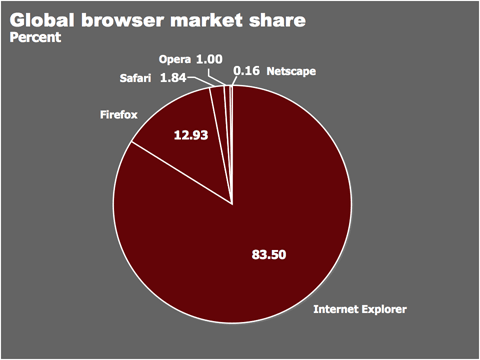It was almost two years ago to the day that we reported on Internet Explorer's first-ever drop in browser market share. At the time, IE usage had dropped from 94.8 percent at the beginning of 2004 to 93.9 percent a few months later. As Firefox approached the big 1.0 milestone, its market share continued to soar, and it passed the 10 percent barrier in October 2005.
Web analytics firm OneStat.com is now reporting that Firefox has grabbed an almost 13 percent market share worldwide, while IE has dropped to just over 83 percent. Firefox's current 12.93 percent market share is up from 11.51 percent in November 2005, while Internet Explorer is down almost 2.5 percentage points. In the US, IE has dipped below the 80 percent mark, down to 79.78 percent, while Firefox has 15.82 percent of the market.
OneStat.com measures browser usage by looking at the traffic at its clients' web sites. The figures from sites using the company's commercial traffic analysis package are combined to come up with numbers that represent the average number of visits from a particular browser. According to TheCounter.com, while IE 5 and 6 combine for 84 percent market share, Firefox has just 10 percent and Safari 2 percent. That's a significant gain for Firefox, which had just 6 percent at the beginning of the year by TheCounter.com's stats.

Source: OneStat.com
Here at Ars, the picture is a bit different. A quick glance at our stats shows that Firefox is the most popular browser with our readers, with 41.92 percent. Internet Explorer accounts for 29.1 percent with Safari at 9.9 percent and Opera at 2.45 percent.
Firefox is even stronger in other parts of the world. In particular, the browser accounts for 39.02 percent of all web traffic tracked by OneStat.com in Germany, with IE sitting at 55.99 percent. Firefox has also broken the 20 percent barrier in Italy and Australia.
With new browsers in the offing from both Microsoft and the Mozilla Foundation, those numbers may be shaken up a bit once Internet Explorer 7 and Firefox 2.0 ship (beta candidate 1 of Firefox 2.0 was released yesterday) later this year. Of course, Internet Explorer is a more radical change from its predecessor, while Firefox 2.0 is a more evolutionary revision. Whether IE 7's new features and improved security settings will be enough to stop the defections to alternatives remains to be seen.
reader comments